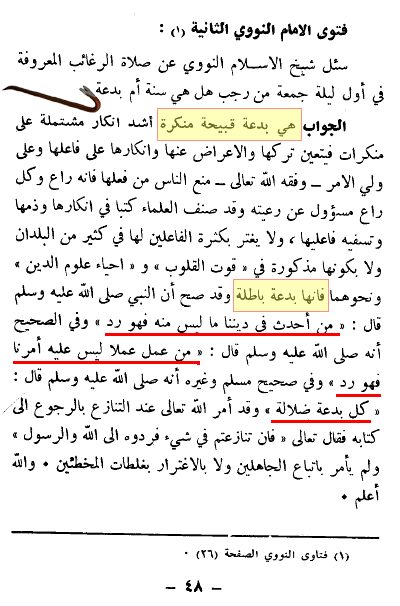 Foundations
Foundations
|
Proof From the Prophet, Companions, the Salaf and the Scholars That the Bid'ah Idafiyyah (Despite Having a Basis in the Shariah) Is Rejected: Part 3 - Al-Nawawi's Refutation of the Bidah of Salat Al-Ragha'ib
Posted by Abu.Iyaad, Editor in Foundations Topics: Bidah Haqiqiyyah • Bidah Idafiyyah |
Quotes from Shafi'i Jurists
We have some valuable quotes in some of the more lengthy articles dealing with the academic fraud of todays innovators in trying to twist the statements of al-Shafi'i and some of the later Shafi'ite jurists such as al-Nawawi and al-Izz bin Abd al-Salam to justify innovations in worship in a broad sense. Because these are important quotes and are buried in long articles, we are going to isolate them and give them their own separate article for easy reference and linking purposes. At the same time it should be pointed out that whilst there is agreement between the general tone and spirit in the rejection by these scholars of innovations in worship and between what the Salaf were upon of the same, because of their particular orientation in understanding this matter, some of these jurists may have allowed certain affairs which the Salaf never allowed and which the Salaf would have treated as blameworthy innovations.
Imam al-Nawawi's Refutation of The Bid'ah of Salat al-Ragha'ib
View this quote in the original article here:
This fatwa can also be found in the printed version of his fatawa in "Fatawa al-Imaam al-Nawawi" organized and arranged by his student Alaa al-Din Ibn al-Attaar, published 1411H in Egypt (on page 31). Again, pay very careful attention to the words used - and then take these choice of words of al-Nawawi and compare them to his commentary on the hadeeth (من سن في الإسلام سنة حسنة) quoted earlier - and you will see the true and real intent of al-Nawawi revealed walhamdulillaah!

Here is the translation of it:
The Shaykh of Islam al-Nawawi was asked about the well-known Salat al-Ragha'ib performed on the first Friday night of Rajab, whether it is bid'ah or sunnah?
The Answer: It is a repugnant, rejected innovation, with the most severe rejection, it comprises many evils, hence it is specifically designated to abandon it and turn away from it and to show rejection againt the one who does it. And it is upon the ruler (one in authority) - may Allaah grant him success - to prevent the people from doing it, for indeed he is a shepherd and every shepherd is responsible for his flock. The scholars have written books in rejection and rebuke of it and declaring those who perform it as fools. One should be not deceived by the abundance of those who perform it in many of the cities, and nor that it is mentioned in [the books] Qut al-Qulub, or Ihya Ulum al-Din and their likes, for it is a futile innovation. And it is authentically related from the Prophet (sallallaahu alayhi wasallam) that he said, "Whoever introduced into this affair of ours that which is not from it will have it rejected." And in the Sahih (of Muslim) that he (sallallaahu alayhi wasallam) said, "Whoever introduced into this affair of ours that which is not from it will have it rejected," and in Sahih Muslim and others that he (sallallaahu alayhi wasallam) said, "Every innovation is misguidance." And Allaah the Exalted has ordered us to return to His Book whenever there is a dispute, so He, the Exalted said, "And if you dispute regarding any matter then return it back to Allaah and His Messenger" (4:59), and He did not ordder the following of the ignoramuses, and nor being decieved by the errors of those who have erred, and Allaah knows best.
Link to this article: Show: HTML Link • Full Link • Short Link
Share or Bookmark this page: You will need to have an account with the selected service in order to post links or bookmark this page.





|
Related Articles:
- Proof From the Prophet, Companions, the Salaf and the Scholars That the Bid'ah Idafiyyah (Despite Having a Basis in the Shariah) Is Rejected: Part 5 - Al-Nawawi Refuting Bidah Related to Prostration
- Proof From the Prophet, Companions, the Salaf and the Scholars That the Bid'ah Idafiyyah (Despite Having a Basis in the Shariah) Is Rejected: Part 4 - Al-Nawawi Refuting a Bidah in the Tarawih Prayer
- Proof From the Prophet, Companions, the Salaf and the Scholars That the Bid'ah Idafiyyah (Despite Having a Basis in the Shariah) Is Rejected: Part 3 - Al-Nawawi's Refutation of the Bidah of Salat Al-Ragha'ib
- Proof From the Prophet, Companions, the Salaf and the Scholars That the Bid'ah Idafiyyah (Despite Having a Basis in the Shariah) Is Rejected: Part 2 - Al-Nawawi's Refutation of the Bidah of Salat Nisf Sha'ban
- Imaam al-Shatibee Explaining Bidah Haqiqiyyah and Bidah Idafiyyah
- Proof From the Prophet, Companions, the Salaf and the Scholars That the Bid'ah Idafiyyah (Despite Having a Basis in the Shariah) Is Rejected: Part 1 - the First Attempts to Innovate in the Time of the Prophet
- Innovation Is of Two Types, Haqeeqiyyah (Essential, Proper) and Idaafiyyah (Relative)
You must be registered and logged in to comment.
| Key Topics | |
| al-fakihani • al-izz bin abd al-salam • al-masalih al-mursalah • al-maslahah al-mursalah • al-mawlid al-nabawi • al-mawlid-al-nabawi • al-nawawi • al-shaatibee • al-shafi'i • al-shatibi • baatiniyyah • bidah haqiqiyyah • bidah hasanah • bidah idafiyyah • fatimids • funerals • good innovation • hajj • ibn hajar • mawlid • misbahah • mother's day • niyaahah • niyyah • prayer • public interest • qur'an • rosary beads • shaking hands • shiah • sunnah hasanah • tabarruk • talbiyyah • tasbeeh beads • ubaydiyyah • | |



